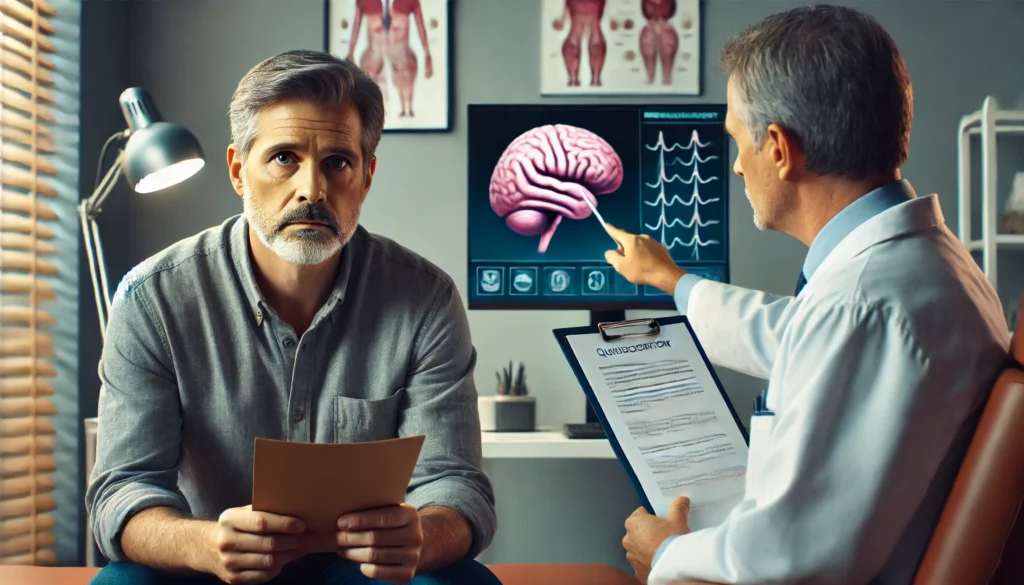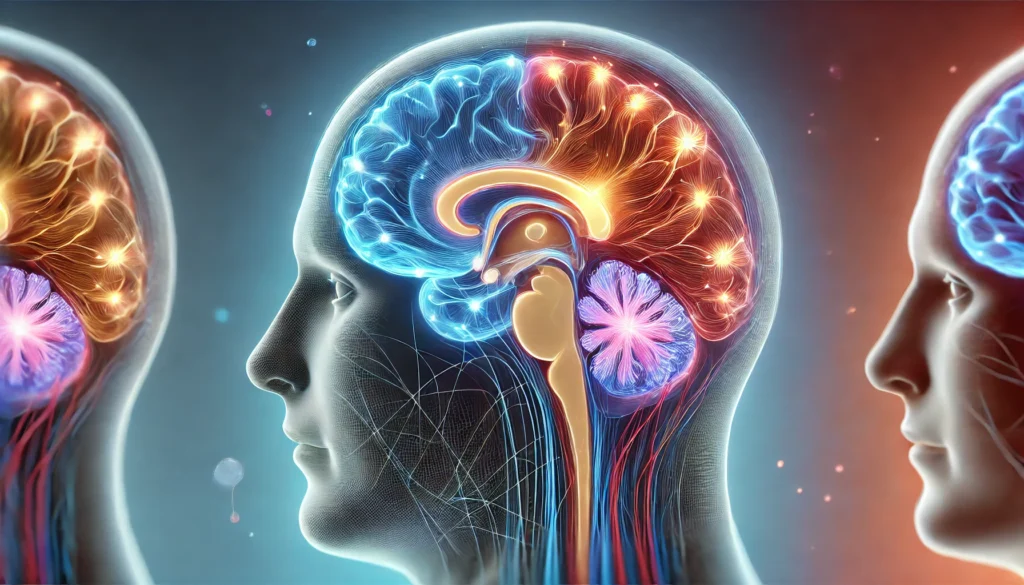Introduction
As the population continues to age and cognitive health becomes a top concern for families and healthcare systems alike, many people are left wondering whether common emotional experiences—such as anxiety—could be early indicators of more serious neurodegenerative disorders. Questions like is anxiety a sign of dementia? are now more relevant than ever, particularly among older adults and caregivers trying to distinguish between normal age-related changes and emerging pathology. Mental health and cognitive decline often intersect in complex, nuanced ways that demand careful scientific scrutiny and compassionate public education.
You may also like: How to Stop Cognitive Decline: Science-Backed Steps for Prevention and Brain Longevity
In the early stages of dementia, subtle shifts in behavior, mood, and emotional regulation may precede noticeable memory loss or confusion. Anxiety, in particular, can arise from an increasing sense of disorientation, fear of mental decline, or chemical and structural brain changes. These emotional fluctuations can feel confusing for both the affected individual and those around them, prompting concern over dementia fear symptoms that aren’t always easy to categorize. Understanding this relationship is crucial—not only for early detection and intervention but also for destigmatizing the emotional experience of those at risk.
This article will explore the scientific relationship between anxiety and dementia, unpack what current research says about causality and correlation, and offer a deeper look at how emotional and neurological symptoms interact. We’ll also examine the role of mental health professionals, diagnostic criteria, and what emerging data suggests about treatment and risk reduction strategies. Through an EEAT-compliant lens emphasizing experience, expertise, authoritativeness, and trustworthiness, we aim to provide clarity for a topic that is as emotionally charged as it is scientifically complex.

Anxiety as a Cognitive Red Flag: What the Research Shows
Growing evidence suggests that anxiety is more than just a psychological response to stress—it may serve as a harbinger of neurodegeneration in some individuals. When asking is anxiety a sign of dementia, it’s critical to explore the body of longitudinal and cross-sectional studies that link persistent anxiety with structural changes in the brain, especially in regions responsible for memory and executive function.
Neuroimaging studies have revealed that individuals with chronic anxiety may experience accelerated shrinkage in the hippocampus, an area vital for memory consolidation and cognitive navigation. This region is also one of the earliest affected in Alzheimer’s disease, the most common form of dementia. Moreover, sustained anxiety has been shown to increase cortisol levels, and chronic exposure to this stress hormone can impair synaptic plasticity and contribute to neuronal loss over time.
Importantly, not all anxiety is created equal. Generalized anxiety disorder (GAD), panic disorders, and late-onset anxiety may each present different risks when considered as possible precursors to dementia. Several meta-analyses indicate that late-onset anxiety, especially when it occurs without a prior psychiatric history, could signal the beginning of a neurodegenerative cascade. However, this association does not confirm causality. Anxiety could also be a reaction to subtle cognitive changes already occurring—making it both a symptom and a potential early warning sign.

Distinguishing Normal Emotional Changes from Dementia Fear Symptoms
Aging naturally brings with it a spectrum of emotional and cognitive changes, many of which are benign or adaptive. It’s important not to pathologize every moment of forgetfulness or stress as a sign of cognitive collapse. Yet distinguishing between typical aging and emerging dementia fear symptoms requires clinical sensitivity and observational nuance.
Older adults often experience transitional anxiety due to life changes such as retirement, bereavement, or health concerns. These emotional responses are typically situational, proportional, and resolve with time or support. In contrast, when anxiety becomes persistent, disproportionate, or accompanied by behavioral changes such as paranoia, disorientation, or social withdrawal, it may raise red flags for deeper neurological concerns.
In particular, when individuals start expressing a persistent fear that they are “losing their mind,” even before objective signs of memory loss are documented, it may indicate a self-awareness of cognitive slippage—an experience described in scientific literature as subjective cognitive decline. These early dementia fear symptoms are often internally distressing and can be predictive of future clinical progression, especially when combined with biomarkers or genetic risk factors.
Healthcare providers and caregivers must be trained to identify not just overt memory lapses but also emotional shifts that deviate from an individual’s baseline personality. This includes new onset irritability, obsessive tendencies, exaggerated startle responses, and pervasive worry—especially when these patterns arise in middle-aged or older individuals without a prior anxiety history.
The Neurobiology Behind Anxiety and Dementia
To understand whether anxiety is a sign of dementia, we must examine the underlying biology that connects these seemingly separate conditions. Anxiety and dementia both involve dysfunction in overlapping brain networks, including the limbic system, prefrontal cortex, and amygdala. These regions govern emotion regulation, threat perception, and decision-making—functions that are compromised in various forms of dementia, including Alzheimer’s, Lewy body dementia, and frontotemporal dementia.
At the neurochemical level, imbalances in serotonin, norepinephrine, and GABA (gamma-aminobutyric acid) can predispose individuals to both anxiety and cognitive dysfunction. Furthermore, neuroinflammatory processes have been implicated in both conditions. Chronic systemic inflammation—fueled by lifestyle factors, infection, or autoimmune issues—may promote neurodegeneration while also sensitizing the brain to anxiety.
Genetic predisposition also plays a role. Variants in the APOE4 gene, a well-known genetic risk factor for Alzheimer’s disease, have been associated with heightened anxiety in some studies. This raises the possibility that certain individuals may be biologically wired to experience both disorders, either simultaneously or sequentially.
Thus, rather than existing in isolation, anxiety and dementia often interact in a bidirectional and mutually reinforcing manner. Anxiety may accelerate cognitive decline through increased oxidative stress and neural inflammation, while emerging dementia pathology may disrupt emotional regulation centers in the brain, giving rise to anxiety as an early symptom.

Psychological Responses to Early Cognitive Changes
Another vital lens through which to view this relationship is the emotional and psychological reaction individuals have to early signs of cognitive difficulty. When someone begins noticing minor lapses in memory or executive function, anxiety often follows—especially in individuals who are highly self-aware or have a family history of dementia. This anxiety is not just reactive; it can become a consuming emotional state that exacerbates cognitive inefficiency, creating a feedback loop.
This phenomenon is particularly relevant in early or preclinical stages of dementia, where individuals may not yet meet diagnostic criteria but nonetheless recognize that “something is wrong.” These individuals may experience what psychologists call anticipatory anxiety—a fear of future decline that becomes so emotionally overwhelming it begins to affect day-to-day functioning.
In many cases, these experiences are compounded by societal stigma surrounding dementia, which can lead to shame, secrecy, and delayed diagnosis. This emotional burden is often referred to as dementia fear symptoms, a cluster of psychological responses that includes fear of burdening others, fear of institutionalization, and fear of loss of self. These fears are not irrational—they are grounded in the real implications of a degenerative illness—but they can become maladaptive if they interfere with early intervention and care planning.
Diagnosing Anxiety in the Context of Cognitive Decline
Clinicians face a significant challenge when diagnosing anxiety in individuals also presenting with cognitive complaints. The symptoms can overlap or obscure one another, and traditional psychiatric interviews may not adequately capture subtle emotional shifts in patients with early cognitive dysfunction.
Assessment tools such as the Geriatric Anxiety Inventory (GAI), the Neuropsychiatric Inventory Questionnaire (NPI-Q), and structured cognitive assessments like the Montreal Cognitive Assessment (MoCA) or Mini-Mental State Examination (MMSE) can help clinicians parse out the interplay between anxiety and cognitive function. However, clinical judgment and caregiver input remain essential.
Moreover, clinicians must differentiate between anxiety that is a standalone psychiatric condition and anxiety that represents an early symptom or psychological response to dementia. In some cases, both may be present, necessitating a dual treatment strategy that addresses both mood stabilization and cognitive protection.
Diagnosing and treating anxiety effectively in this population is vital, as untreated anxiety can lead to sleep disturbances, social isolation, reduced physical activity, and even medication noncompliance—all of which may accelerate cognitive decline.
Anxiety Subtypes and Dementia Risk
Not all anxiety disorders carry the same risk for dementia, and understanding the subtype is important for personalized care. Generalized anxiety disorder, characterized by excessive and uncontrollable worry, has been most frequently associated with cognitive decline in epidemiological studies. Panic disorder and social anxiety disorder show weaker or inconsistent associations.
Late-onset anxiety, which develops after the age of 60, is of particular concern. This subtype is often under-recognized and misdiagnosed as depression or normal aging. However, research suggests that individuals with late-onset anxiety—especially when accompanied by apathy or executive dysfunction—may be at higher risk for progressing to dementia.
Furthermore, anxious-depressive syndromes, where both conditions coexist, appear to confer an even higher risk. This comorbidity creates a more severe and treatment-resistant clinical picture, often involving greater cognitive impairment, higher caregiver burden, and more rapid decline.
Tailoring treatment to the specific anxiety subtype and comorbid conditions can improve quality of life, reduce subjective distress, and potentially slow cognitive deterioration in at-risk individuals.

Treatment Strategies for Anxiety in the Context of Dementia Risk
Treating anxiety in older adults or those at risk for dementia requires a multifaceted approach. Pharmacological options such as SSRIs (selective serotonin reuptake inhibitors) are generally preferred over benzodiazepines, which can impair cognition and increase fall risk. However, medication should never be the first or only line of defense.
Psychotherapeutic interventions like cognitive behavioral therapy (CBT) have shown promise in reducing anxiety while improving cognitive resilience. Modified CBT protocols that include memory aids and caregiver support can be particularly effective for individuals with mild cognitive impairment or subjective cognitive complaints.
Lifestyle interventions also play a pivotal role. Physical exercise, particularly aerobic activity, has been shown to reduce both anxiety symptoms and the risk of dementia. Mindfulness-based stress reduction (MBSR), yoga, and breathing techniques can enhance emotional regulation while also improving sleep and cardiovascular health—factors closely linked to cognitive performance.
Early identification and management of anxiety may not only enhance emotional well-being but also serve as a proactive measure in dementia prevention strategies. In this light, understanding and addressing dementia fear symptoms becomes not just a matter of mental health, but of long-term cognitive preservation.
Gender, Culture, and the Experience of Dementia Fear Symptoms
The experience of anxiety and dementia fear symptoms is not uniform across populations. Women, for example, are more likely than men to experience anxiety disorders and also have a higher lifetime risk of developing Alzheimer’s disease. This intersection suggests that hormonal, social, and psychological factors may amplify emotional responses to cognitive changes in women.
Cultural perceptions of aging and mental health also shape how individuals interpret and report their symptoms. In some cultures, cognitive decline may be viewed as a shameful or supernatural phenomenon, leading to denial or underreporting. In others, emotional expressions of fear may be dismissed as weakness or senility.
Healthcare providers must adopt a culturally competent approach, taking into account gender norms, language barriers, and cultural beliefs when evaluating and treating anxiety in older adults. Understanding the nuanced ways that fear, anxiety, and dementia are expressed and interpreted across different groups is key to delivering compassionate and effective care.
Frequently Asked Questions
1. What is the connection between anxiety and dementia?
Emerging research suggests a significant overlap between anxiety and dementia, particularly in terms of brain regions affected and biochemical pathways involved. Anxiety can serve as both an emotional response to early cognitive decline and a potential risk factor due to its impact on brain health. Chronic anxiety may accelerate hippocampal atrophy, disrupt neurotransmitter function, and increase systemic inflammation—all of which contribute to neurodegenerative processes.
2. Can anxiety be the first sign of dementia?
Yes, in some cases, anxiety may precede noticeable cognitive symptoms and act as an early emotional warning sign. Late-onset anxiety, particularly in individuals with no prior psychiatric history, may reflect subtle neurological changes that precede dementia. Recognizing this potential connection is critical for early intervention and care planning.
3. How can dementia fear symptoms manifest?
Dementia fear symptoms often present as persistent worry about cognitive decline, hypervigilance regarding memory lapses, social withdrawal, and emotional distress about becoming a burden. These symptoms are often internalized and may not be readily apparent to others, making careful evaluation essential. They can also interfere with help-seeking and delay diagnosis.
4. Is anxiety common in people with Alzheimer’s disease?
Yes, anxiety is highly prevalent in individuals with Alzheimer’s disease, particularly in the early and middle stages. It often stems from confusion, frustration, and awareness of one’s own limitations. Treating anxiety in these individuals is crucial for maintaining quality of life and slowing functional decline.
5. What brain changes link anxiety and dementia?
Both conditions involve structural and functional changes in the limbic system, hippocampus, and prefrontal cortex. Chronic anxiety can lead to neural atrophy and impair neuroplasticity, while dementia-related degeneration in these regions can disrupt emotional regulation, thereby causing anxiety. Neuroinflammation, oxidative stress, and neurotransmitter imbalances are also shared pathways.
6. How is anxiety diagnosed in individuals with memory complaints?
Diagnosis typically involves a combination of clinical interviews, standardized anxiety scales, and cognitive assessments. Input from caregivers is often invaluable in providing context. Differentiating between anxiety as a standalone condition and as a symptom of early dementia requires careful analysis of onset, duration, and associated behavioral changes.
7. Can treating anxiety reduce the risk of dementia?
While definitive proof is still under investigation, treating anxiety—particularly in midlife or late life—may reduce behaviors and biological processes that contribute to cognitive decline. Improving sleep, reducing inflammation, and increasing physical activity through anxiety treatment can all contribute to better brain health over time.
8. Are some people more prone to dementia fear symptoms?
Yes, individuals with a family history of dementia, high health literacy, or a history of anxiety disorders may be more susceptible to dementia fear symptoms. Cultural, societal, and gender factors can also influence how these fears are expressed and whether they lead to helpful or maladaptive behaviors.
9. How do doctors treat anxiety in those at risk for dementia?
Doctors often use a combination of pharmacological and non-pharmacological treatments, including SSRIs, CBT, mindfulness, and lifestyle interventions. Benzodiazepines are typically avoided due to cognitive side effects. Involving family and caregivers in the treatment plan helps ensure continuity and improves outcomes.
10. Should anxiety in older adults always be evaluated for dementia?
While not every case of anxiety signals dementia, new-onset anxiety in older adults—especially when accompanied by personality changes or memory issues—warrants further evaluation. Early diagnosis enables more effective treatment, improved planning, and better quality of life for both the individual and their support network.

Conclusion
The question is anxiety a sign of dementia reflects a growing awareness of the complex interplay between emotional and cognitive health. As we deepen our understanding of brain aging, it becomes clear that mood disturbances are not mere background noise—they are integral parts of the clinical picture and may offer early insights into neurodegenerative changes.
Dementia fear symptoms, too, deserve clinical recognition as more than just existential worry. These fears are rooted in personal history, biology, and a realistic appraisal of what cognitive decline can mean. When approached with empathy, scientific literacy, and a commitment to early intervention, anxiety becomes not just a red flag but a call to action.
Ultimately, integrating mental health care into dementia prevention strategies offers a more holistic, compassionate, and effective approach to aging well. By addressing anxiety early, fostering open dialogue about cognitive concerns, and promoting lifestyle changes that support brain health, we can empower individuals to face aging with dignity, clarity, and hope.
Was this article helpful? Don’t let it stop with you. Share it right now with someone who needs to see it—whether it’s a friend, a colleague, or your whole network. And if staying ahead on this topic matters to you, subscribe to this publication for the most up-to-date information. You’ll get the latest insights delivered straight to you—no searching, no missing out.
Further Reading:
How Early Can Dementia Start? Understanding Early Onset Dementia, Warning Signs, and What to Watch For



